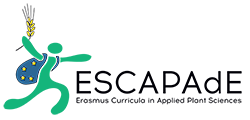English title:
Plant nematology
Course ID:
953309
ECTS credits:
1,5
Title in native language:
Plant nematology (in Eng.)
Plant nematology (in Eng.)
Term Semester:
Autumn/Winter
Instruction language(s):
English
Course content:
Nematodes are important members of many ecosystems at different levels in the trophic hierarchy.
The focus of this course is set on the biology of plant parasitic nematodes, their economic relevance and their control.
Students are introduced into nematode structural and functional anatomy, strategies of plant parasitism, the interaction with the host plant, and nematode virus transmission.
Examples are presented to show the importance of nematodes in different agrosystems and to give insights in the general principles of nematodes control. Problems of applied plant nematology are discussed and related to the current basic research in these fields.
.nt agrosystems and to give insights in the general principles of nematodes control. Problems of applied plant nematology are discussed and related to the current basic research in these fields.
.
The focus of this course is set on the biology of plant parasitic nematodes, their economic relevance and their control.
Students are introduced into nematode structural and functional anatomy, strategies of plant parasitism, the interaction with the host plant, and nematode virus transmission.
Examples are presented to show the importance of nematodes in different agrosystems and to give insights in the general principles of nematodes control. Problems of applied plant nematology are discussed and related to the current basic research in these fields.
.nt agrosystems and to give insights in the general principles of nematodes control. Problems of applied plant nematology are discussed and related to the current basic research in these fields.
.
Expected previous knowledge:
Basic biology and agriculture<br>.
Learning outcomes:
Upon successful completion of this lecture, students will possess comprehensive knowledge in basic plant nematology (morphology, biology, symptomatology, molecular aspects of nematode parasitism etc.). In addition, they will be able to distinguish between different soil-borne nematodes such as free-living, predatory or plant-parasitic ones. Moreover, based on above- and belowground symptoms students will be able to recognize the nematode infection and the group of nematodes that the attacker belongs to (cyst, root-knot or migratory nematodes).
Teaching and learning methods:
Lectures, movies, exercises:
Lecture is supported by powerpoint slides, movies and short practical parts enabling the students to get hands on different fresh materials such as plant infected with nematodes, sterile nematode cultures etc. In extended pratical part soil organisms will be extracted from the soil and examine microscopically.
Lecture is supported by powerpoint slides, movies and short practical parts enabling the students to get hands on different fresh materials such as plant infected with nematodes, sterile nematode cultures etc. In extended pratical part soil organisms will be extracted from the soil and examine microscopically.
Exam method:
written test (1 hour) containing multiple choice questions, pictures to recognize etc. Max. 90 points (51 – 60 points – mark 4, 61 – 70 points – mark 3; 71 – 80 points – mark 2; 81 – 90 points – mark 1).
Organisation: University of Natural Resources and Life Sciences Vienna
Country:
Austria
Acronym:
BOKU
ERASMUS+ code:
A WIEN03
Teaching period summer semester:
22. Feb 2021 - 30. Sep 2021
Teaching period winter semester:
13. Oct 2020 - 21. Feb 2021
University website:
